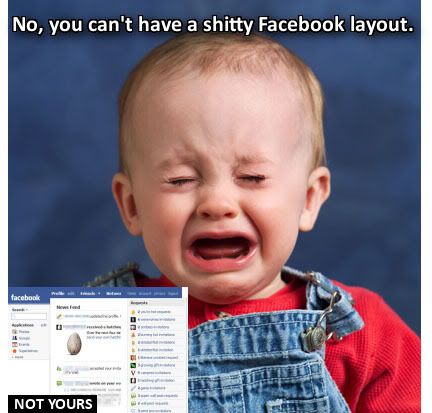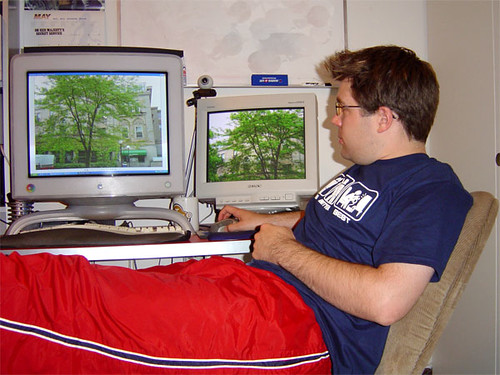Being the lazy sonofabitch that I am, I'm not even going to write any new material especially for this post. Instead, I'm going to paste a (slightly abridged) note which I wrote on my Facebook profile earlier today for the edification of my "friends".
Here goes:

There's been a great deal of whining lately about the new Facebook layout, and more than a few Facebook groups dedicated to its eradication, but why all the hate? Since I have nothing better to do on this chilly Sunday afternoon, I'll take a stab at attempting to justify the new layout. It's very
tldr, but try to bear with me. Besides, if you don't like reading you have no business being on the Internet in the first place.
I suppose the most simple answer for all the hate is because people fear change - and often with good reason: A new layout means that most non-tech savvy users (read: 90% of you) will have to spend time getting reacquainted with where to click in order to perform any given task.
In order to understand why the change came about in the first place, however, requires understanding the reasons that precipitated it. The fact of the matter is that Facebook was turning into a ridiculous parody of itself.
When I want to go to your profile to, for example, get your phone number or e-mail address, that's basically all I'm interested in. I couldn't give a
fuck how many zombies you made, or how attractive your peers find you. Nor do I have any interest whatsoever in seeing the idiotic movie clips and ancient, dried up, "funny" images posted on your so-called Super Wall. As interesting and amusing as these applications may be to you, the ultimate truth is that nobody else gives a shit. So why should I get bombarded with your superfluous crap that steals my bandwidth, melts my CPU and crashes my browser, when all I want is your fucking e-mail address?
This is the same fate that befell MySpace when they decided to allow its users to customize their own profiles as they saw fit - the dreaded "MySpace Syndrome". 99% of profiles became so afflicted with hideous layouts, that when Facebook showed up, everybody jumped ship for the promise of a more sane social network.
Today, the only people who still regularly use MySpace are lonely 13-year-olds and out-of-touch record labels.
This is what Facebook was turning into because of people like
you. Every second profile was becoming so overloaded with ridiculously stupid and unnecessary application boxes that they became nigh on unusable. If things were allowed to escalate, then those of us who are not complete and utter morons would have left to find another social network to call our own. Bebo or Orkut or maybe even one that doesn't suck. At least until you retards with your Pirates vs Vampires shit decided to seek us out yet again. No, the line must be drawn somewhere and that somewhere is here.
"But it's my profile, I can do whatever I want to it!" I hear you belch? Well, no it isn't. A Facebook profile is not public property. It's virtual, private property, and unless you paid money for your profile, you have exactly zero say over it. Furthermore, if you had read the Facebook
Terms of Use before signing up (you didn't, am I right?), you'll know that everything that gets posted to Facebook becomes the property of Facebook and they can do with it pretty much whatever they want. Uploading all those pictures of little Billy's first steps doesn't seem like such a good idea anymore, now does it?
The new Facebook layout arranges everything into dynamic tabs. This means that the content of any given tab only gets downloaded when I click on that tab. And, fortunately, Facebook included a "bullshit" tab. Oh, I'm sorry, I meant to say "boxes" tab. This is where your Super Wall, Top Friends, and other assorted crap nobody cares about goes. This means that your applications can now be seen only by people who really want to see them (read: nobody).
Now, I'm all for choice. Some of you don't want the new layout gone permanently, you just want the option to go back to the old one. That's not too unreasonable, is it? Well, no it's not. Unfortunately, though, it's not gonna happen and here's why:
If Facebook decided to keep both the old and new layouts this means that, in future, whenever they wanted to add or extend functionality to the site they'll be severely hampered in doing so. Worst case scenario, it'll be impossible. Best case scenario, they'll have to do twice the amount of work. Which means twice the number of man-hours. Which means twice the expense. From a business point of view (and remember Facebook is a business, not a public service - they don't owe you jack shit) having two concurrent layouts is completely unfeasible.
What this means is that there can be only one layout. Shouldn't it be the better, more evolved of the two options? The one that's more convenient to use, overall less threatening to Facebook's revenue stream and, let's face it, less embarrassing.
Ultimately, if you don't like it you're free to join another social network. I recommend MySpace where you'll be free to show off your Zombies and Top Friends with all the lonely 13-year-olds and out-of-touch record labels. They just love that shit.


